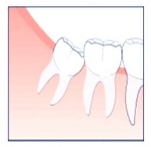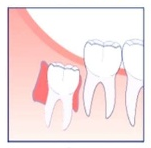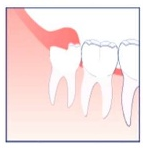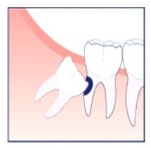Wisdom teeth Treatment
Wisdom teeth are the third and final set of molars that most people get in their late teens or early twenties. Sometimes, the wisdom teeth can be a valuable asset to the mouth when healthy and properly aligned, but more than often, they are misaligned and require removal.
What is an “impacted” wisdom tooth?
The term “impaction” is used when the wisdom teeth are misaligned. The wisdom teeth may be impacted horizontally, be angled toward or away from the second molars, or be angled inward or outward. Poor alignment of wisdom teeth can crowd or damage adjacent teeth, the jawbone, or nerves.
Do I need to remove my wisdom teeth?
Wisdom teeth usually require removal when they are impacted (misaligned). They are enclosed within the soft tissue and/or the jawbone or only partially break through or come through the gum. Partial eruption of the wisdom teeth allows an opening for bacteria to enter around the tooth and cause an infection, which results in pain, swelling, jaw stiffness, and general illness. In very rare cases the wisdom tooth infection can lead to cysts to be formed. Partially erupted teeth are also more prone to tooth decay and gum disease because their hard-to-reach location and awkward positioning makes brushing and flossing difficult
If left, the impacted wisdom teeth can lead to decay and damage on the adjacent teeth or fillings.
How do I know if I have wisdom teeth?
Ask your dentist about the positioning of your wisdom teeth. He or she may order a special x-ray (called an OPG) periodically to evaluate for the presence and alignment of your wisdom teeth.
Your dental surgeon may recommend that your wisdom teeth be extracted even before problems develop. This is done to avoid a more complicated extraction that might have to be done a few years later. Removal is easier in young people, when the wisdom teeth roots are not yet fully developed and the bone is less dense. In older people, recovery and healing time tend to be longer and the extraction is usually more difficult.
How are wisdom teeth removed?
To make the procedure as pain free and comfortable as possible, your dental surgeon may suggest that you have your wisdom teeth taken out under General Anaesthetic at our local Day Surgery Unit at the Ballarat Day Procedure Centre.
What happens leading up to my wisdom tooth removal?
Dr. Goubrial will assess your wisdom teeth and have a consultation with you. During the consultation, Dr. Goubrial will answer all your questions and discuss risks, options, fees, recovery and potential dates to have your surgery.
What happens after my wisdom teeth are removed?
After your wisdom teeth are removed, Dr. Goubrial will review all of his surgical patients back at the office at the Practice to assess healing and make sure that everything is going well.




